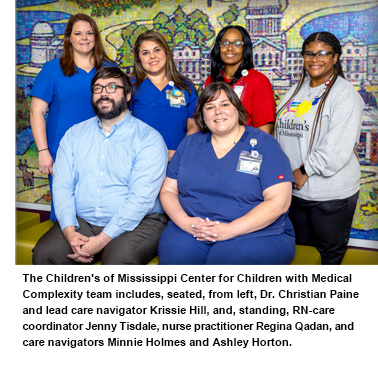Complex Care Coordination
Good morning.
Before I share this week’s topic, I want to thank all members of the UMMC family who have stepped up during this water crisis. You have worked quickly and effectively on behalf of patients and employees to ensure clinical care could continue.
I greatly appreciate your efforts.
I know this is a difficult time for many of you personally. As outlined in a Campus Memo, the Medical Center wants to support you during this time. You should discuss with your supervisor any arrangements you need to make because of school or child care closures. Also, we have available the UMMC Remote Work Policy, which can be used where appropriate, based on consultation with your supervisor.
Now on to this week’s topic.
Serving Mississippians, especially our most vulnerable patients, is the bedrock of our health care responsibility. Families with children who have complex health needs often depend on the state’s only children’s hospital for their care, and we consider it an honor.
 A program in Children’s of Mississippi is a wonderful example of how we provide the best care for children with chronic illnesses in a way that benefits the patients and families AND also reduces the cost of health care for the state. One of our priorities in the 2025 UMMC Strategic Plan for our clinical mission is to maximize value in the quality of health care we provide. Under that strategy, we have four goals, but I would like to highlight the following two today as it directly relates to the children’s program:
A program in Children’s of Mississippi is a wonderful example of how we provide the best care for children with chronic illnesses in a way that benefits the patients and families AND also reduces the cost of health care for the state. One of our priorities in the 2025 UMMC Strategic Plan for our clinical mission is to maximize value in the quality of health care we provide. Under that strategy, we have four goals, but I would like to highlight the following two today as it directly relates to the children’s program:
- Enhance inpatient care coordination
- Reduce direct cost of care through efficiency and effectiveness
A team of clinical and administrative staff and leadership in Children’s is doing an outstanding job of meeting those expectations through the Center for Children with Medical Complexity. It all comes down to making sure children with complex health care needs receive the right care at the right time, which saves patients’ families time and makes the children’s hospital more efficient and effective in the delivery of services.
Children’s partnered with a health plan in 2021 on a pilot project to provide enhanced communication with families and providers, coordination of services to meet patient health care needs and promotion of wellness and follow-up care. The program has proved so successful that we have interest from other health plans for additional partnerships. So, what’s the success story?
Based on preliminary data, the Center generated an estimated
- 25% savings in health care costs to the state in 2021 over the baseline year,
- a greater than 50% reduction in the number of emergency room visits and
- an 18% increase in annual wellness visits.
Those are incredible stats! But while those numbers are impressive, what’s most important is the positive impact on patients who had better health outcomes because of this innovation and hard work. Children requiring complex care need treatment from multiple specialists, and that means more coordination among caregivers. Children with medical complexity are in the top 1% of children with multiple chronic diagnoses requiring extensive therapy, pharmacy or counseling needs, which includes a variety of conditions, but not limited to, quadriplegia, severe seizure disorders, cystic fibrosis and ventilator dependence.
This work dates back at least four years ago. Dr. Guy Giesecke, CEO of Children’s of Mississippi, guided the conversation about better coordination of care in collaboration with doctors, nurses and other health leaders. Around this same time, the Pediatric Complex Care Division was developing a true clinic home for medically complex patients that we followed directly at UMMC. I’d like to thank all those who were a part of the working group on this program, including Guy, Dr. Mary Taylor, Dr. Chris Collado, Dr. Charles Paine, Regina Qadan, and other UMMC and state stakeholders.
They planned each stage of the program, how to track success, and the benefits for the children, their families, the state and UMMC. A job well done!
Drs. Collado and Paine and Regina Qadan continue to provide administrative and clinical leadership for the Center. To advance the Center’s care coordination and other public health opportunities, Krissie Hill was recruited as the first lead care navigator. She and two other navigators, Minnie Holmes and Ashley Horton-Brooks, along with Jenny Tisdale, RN Care Coordinator, have done a great job of contact and coordination with patients. Working with families to provide the support they need to ensure their child’s health will continue to be critical to the program’s success.
This level of dedication and collaboration is inspiring, not just for all of us in the UMMC community but for all those children needing our services. As we continue expansion of the Center’s work, we are creating A Healthier Mississippi for children with complex health care needs.



